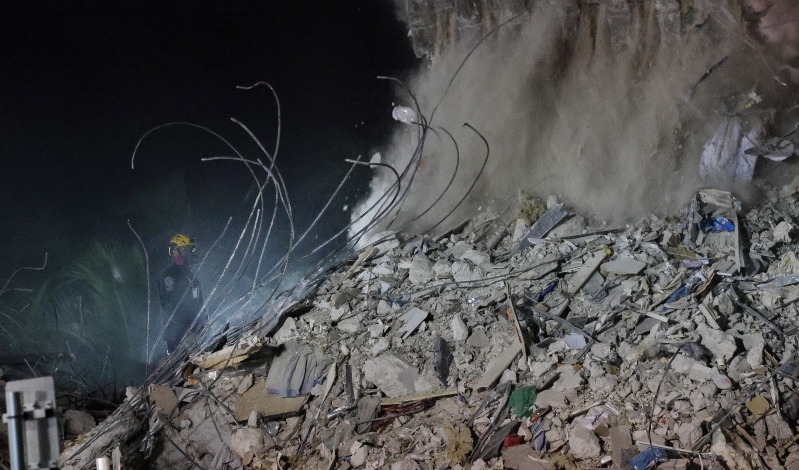
Lack of regulation contributed to the collapse of the Champlain Towers South building.
The families of those who occupied the Champlain Towers South condo building the night of June 24 are feeling the consequences of a collective failure to manage risk with an acuteness that few of us ever experience. How this failure happened is still not clear, but it is coming into sharper focus every day.
A 2018 engineering report on the structural integrity of the Champlain Towers South complex in Surfside, Florida warned of major structural damage and “abundant” cracking and crumbling of support-bearing columns. The report also explained why extensive repairs were necessary. The board of the Champlain Towers South condo association commissioned the report to comply with a “40-year-old building” recertification requirement. Only two Florida counties, including Miami-Dade County where the complex is located, have these recertification requirements.
In 2008, the state of Florida briefly required regular structural integrity inspections of condo buildings over three stories. The statute, however, was repealed two years later when some associations complained about the high costs of the inspections.
No Florida state law requires association boards to repair structural problems when they are discovered. In Miami-Dade County, the 40-year-old building recertification provision requires structural or electrical problems identified in the process to be repaired within 150 days from when the process commences. Local officials did not enforce this requirement for the Champlain Towers South condo building.
No Florida state law requires condo associations to establish reserve funds for emergency repairs. Local officials can condemn unsafe buildings and order their evacuation, as happened with a North Miami Beach condo building when it was inspected after the Surfside collapse. But—at least until now—the identification and review of unsafe buildings in Florida has been haphazard at best and nonexistent at worst.
Light-touch regulation is also apparent in the history of fire safety regulation for Florida condominiums. In 2017, the legislature passed a bill to ease fire safety rules for multi-story condos, but it was vetoed by former Governor Scott, who cited a recent fire in a London high-rise that killed 72 people. But in 2019, the legislature passed and Governor DeSantis signed a bill that postponed a sprinkler retrofitting requirement until 2024 and left in place a provision allowing an association to opt out of the requirement by a majority vote.
This spirit of hands-off regulation has left it to condo association boards to identify and manage risks and decide whether and how to respond. The members of these boards are volunteer residents elected by fellow residents. Board members are not required to have financial, management, engineering, or planning expertise or training. The legislature did create a trust fund, underwritten primarily by fees assessed on associations, to help implement Florida’s condo laws and regulations. The government division responsible for managing the trust considers educating condo board members as one of the trust’s purposes. Yet since 2008, the legislature reportedly has diverted approximately $65 million, or nearly 40 percent, of the trust’s funds into the state’s general fund. The division reportedly held 22 training sessions in FY2020—in a state with more than 20,000 condominium associations.
Essentially, the members of these boards—and the association residents when voting on proposals submitted to them by their boards—are on their own to make decisions about the buildings they occupy. So, boards and residents have the discretion to delay or decline to make repairs even if dangerous conditions threaten their lives. Local officials may condemn unsafe condos, but this presumes an inspection has occurred and that the local officials know about it, which brings us back to square one.
The government enacts regulations to ensure the welfare and safety of its people. For example, states regulate the insurance industry to protect consumers. Without regulation, insurers would be free to operate with insufficient capital, maintain insufficient reserves to pay for future losses, invest reserves in excessively risky products to maximize returns, and treat consumers unfairly to minimize the payment of claims.
Condo association boards are not insurers, but, like insurers, they manage risk for the mutual benefit of all whom they represent. They make decisions about how much to spend on landscaping, paint, and pool furniture, but also about inspections, maintenance, repairs, and a host of factors relevant to the safety of the buildings. In Florida and many other states, the decisions of these boards are not subject to external review. In fact, they are essentially unregulated—which is appropriate for picking pool furniture but not for decisions affecting the structural integrity of high-rise buildings.
Sadly, many have liked it this way. Many condo owners do not want the government telling them how to manage their buildings any more than they would accept government regulation if they lived in a single-family residence, where government oversight is virtually nonexistent. Developers and investors oppose laws that slow down high-rise construction or complicate sales. And Florida legislators and local officials have not pushed for change, given the tax base that depends on the development of coastal property and what happens in coastal communities.
But having the freedom to operate beyond the reach of government regulation has a price. The implications of this freedom are all too vivid in Surfside, and the narrative is hardly new. In Texas, the hands-off approach to zoning regulation greatly increased the flooding of homes during Hurricane Harvey in August 2017, and the deregulated electricity industry could not maintain the electric grid serving millions of citizens during a cold spell in February 2021.
In California, all levels of government understood the risks of potential wildfires, but did not mitigate the risk of fire catastrophe until the town of Paradise burned to the ground in November 2018.
In Washington, D.C., the Federal Aviation Administration faced budget cuts and anti-regulatory politics, so it delegated some of its safety certification process to Boeing. As a result, Boeing carried passengers in planes with design defects that caused two crashes and the loss of 346 lives before the fleet was grounded for correction of the defect.
The list goes on.
Freedom feels good, but it comes with a price. And sadly, it takes a tragedy such as Surfside to demonstrate that the price of a hands-off approach to regulating safety in high-rise residential housing is too high. Losing confidence in the safety of one’s residence, where the potential for loss of property and life is obvious, is even more devastating than losing confidence in the reliability of an insurance policy. Yet unlike insurance policies and the companies that sell them, Florida and other states regulate the structural integrity of buildings with a very light touch.
Surfside is not just a failure of private risk management. It is also a failure of government regulation. The costs of not regulating are clear. Just as they have done with insurance, which is a regulated industry, Florida legislators must recognize the importance of responsible regulation of their building infrastructure. Floridians must dump the refrain that calls for getting the government “off my back.”




